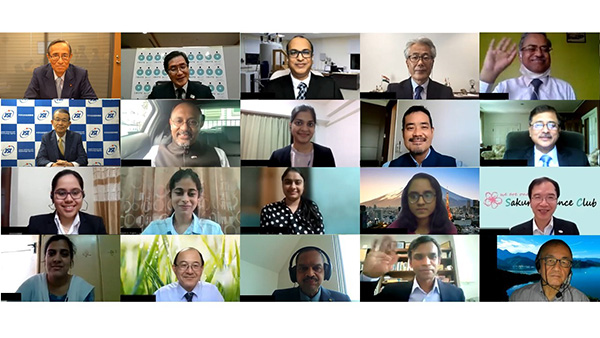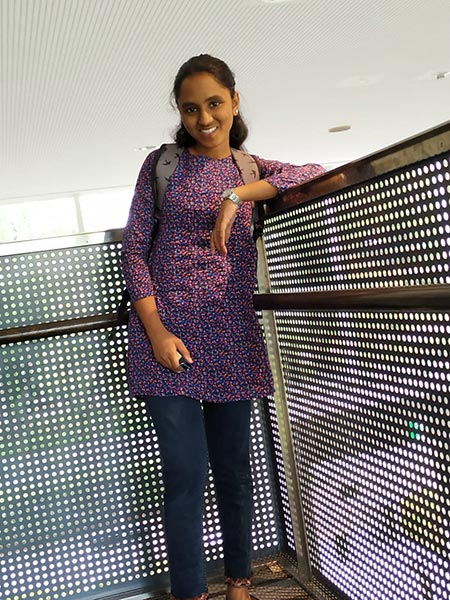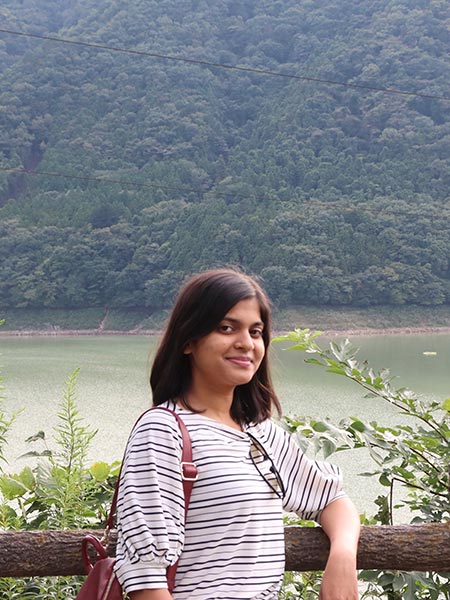Events
The 3rd India Alumni Meet Successfully Carried Out Online
Following the 1st (Oct 2018) and 2nd (Feb 2020) meetings held in New Delhi, the 3rd meeting was held online on May 29, 2021, with 105 participants across the globe. Thanks to the efficient coordination between ISCA (India Sakura Science Club Alumni Association) and JST, it was carried out smoothly for most parts. Although SSC events are often hosted as “alumni meetings,” they are open Webinars for everyone. Each time, organizers try to invite many inspiring speakers for the benefit of all viewers.

Presentations by 2021 Pravasi Bharatiya Samman Award (PBSA)
The 3rd alumni meeting welcomed two PBSA recipients in Japan.
Prof. Muralidhar Miryala from Shibaura Institute of Technology (SIT) introduced his research on “high-Tc superconductivity” which allows effective transportation of energy without loss. The technology has many industrial usages in medicine-health, transport, and power generation-transmission. In addition to the Sakura Science Program (SSP), Prof. Miryala helped foster several programs at SIT to attract students from India ranging from high school internship, global project-based learning to PhD invitation programs. He encouraged prospective students to apply to SIT’s Global Full-time programs offered fully in English.
Based on his own experience of obtaining his master’s and PhD degrees in Japan, Prof. Rajib Shaw of Keio University pointed out three attractive points of Japan’s higher education system through his 25-year teaching career in Japan:
1) Homogeneity in education: Mid-level universities also maintain high quality education with some unique area of regional characteristics.
2) Freedom of education: One can make up one’s own roadmap through the 4-year undergrad and 2-year master’s course
3) Respect in education field: Educators are well respected in Japan.
Two years ago, India/Japan Lab was formed at Keio Univ. to enhance multilateral research in emerging technology and to encourage students to explore job opportunities in both countries. There is also a startup grant for disruptive ideas.
“When innovative improvisation or Jugaad (in Hindi) is mixed with Japan’s Omotenashi (quality of service) and Kaizen (quality control), it can lead to a revolution in different sectors around the global community,” Prof. Shaw concluded.
Presentation by Professors Invited by ISCA Coordinators
Prof. Manish Biyani, currently a Research Professor at Japan Advanced Institute of Science and Technology (JAIST) spoke about how needs-seeds matching is important to achieve productive results through the Sakura Science program. That way, the program can nurture intellectually tough human resources and can result in a match for bilateral research. He advised that research should be transformative for society and that researchers should work to create solutions to real-world problems. He illustrated how the need to overcome heavy metal toxicity in ground water led to the development of a portable testing device and of a filter to remove heavy metals from water. To answer the need for a lab-free Covid-19 testing, his group created a robot that can handle 100 patient samples within 30 minutes to get results anywhere.
Prof. Wagatsuma Hiroaki, currently an Associate Professor at Kyushu Institute of Technology (Kyutech) focuses on Brain-Inspired Systems Research (Brain-IS). Alongside his Sakura Science collaboration with IIT Kanpur, his research is funded by different government grants in Japan and his group collaborates with both academia and private companies in and outside of Japan. Brain IS tries to enhance human-machine interaction, and to help build intelligent and social robots that can interact with us on a daily basis. Concrete examples would be automated driving systems or assistive devices, where the robot has to “think” real-time to make decisions. In his eye, PhD students from India working in Japanese companies are highly evaluated with good salary. Kyutech offers the Global AAR (advanced assistive robots) program supported by MEXT government scholarship and international students are highly welcome.
Presentation by Sakura Alumni Members
After some practical and eye-opening presentations about study and work in Japan by Mr. Miyamoto Shingo (Minister, Embassy of Japan in India) and Mr. Miyauchi Yasuyuki (Director of the University of Tokyo India Office), two alumni members shared stories about studying and working in Japan.
Ms. Swetha Soundrarajan joined Sakura Science in 2018 at Nippon Institute of Technology, and was admitted to the University of Tokyo PEAK Course (environmental science) in 2020. In view of Covid-19 she has not arrived in Japan yet, but explained that the university is doing the best to cater to international students by assisting with the transition to online learning and by hosting online events to connect international students.
Her tips were, to attend studying in Japan sessions as much as you can to find out what suits your academic interest. Through the application process she also found that extracurricular activities and non-academic skills are also important Japanese language skill is always a plus.
Ms. Bhargavi Thakur, who is working as a Civil Engineer at East Japan Railway Company (JR East-Tokyo Construction Office) since 2019, entered the University of Tokyo for her master’s degree and started working right after graduation. Her work involves design check of new structures and R&D. She explained that Japan is a good place to start one’s career because Japanese companies provide good training (OJT) and opportunities for career change outside your field. Someone majoring in agricultural engineering for instance may choose to work in the software department. She also mentioned that career interests of employees are valued through periodical evaluation. Employees are encouraged self-learning and exploration of their own interests. Japan is also some of few countries that provide overtime pay, commuting allowance, and many other benefits.
JST and the Secretariat would sincerely thank all dignitaries, invited guest speakers, and all ISCA coordinators namely Dr. Jeetender Chugh (ISCA Main Coordinator), Ms. Disha Malik, Ms. Mansi Sharma, Ms. Antara Puranik and many others.
From both India and Japan there were compassionate messages from Dr. Kishi Teruo (Director General, Sakura Science Program HQs), Mr. Hosoda Hiroyuki (Member, House of Representatives, Japan; President of the Japan India Parliamentarians’ Friendship League), Ambassador Suzuki Satoshi (Embassy of Japan in India), Ambassador Sanjay Kumar Verma (Embassy of India in Japan), Mr. Matsuo Hiroki (Deputy Minister, MEXT, Japan) and Dr. Sanjay Mishra (Head & Adviser, Kiran & INSPIRE, Department of Science and Technology, Government of India). Again, JST deeply thank all honorable guests for showing such warm support.









